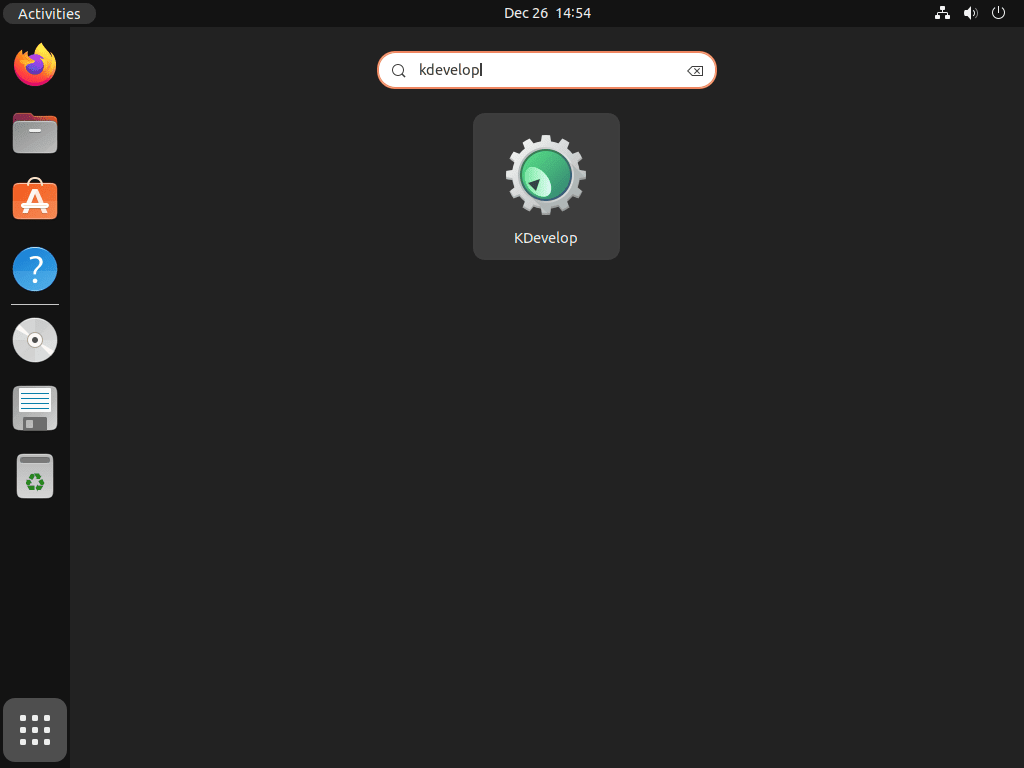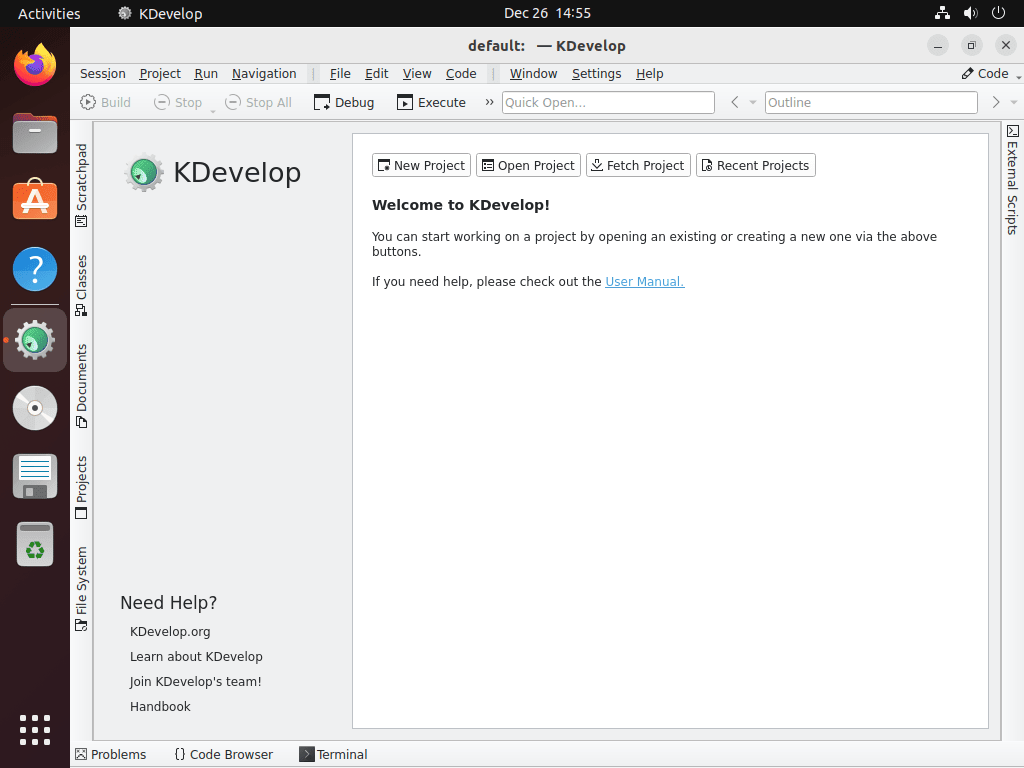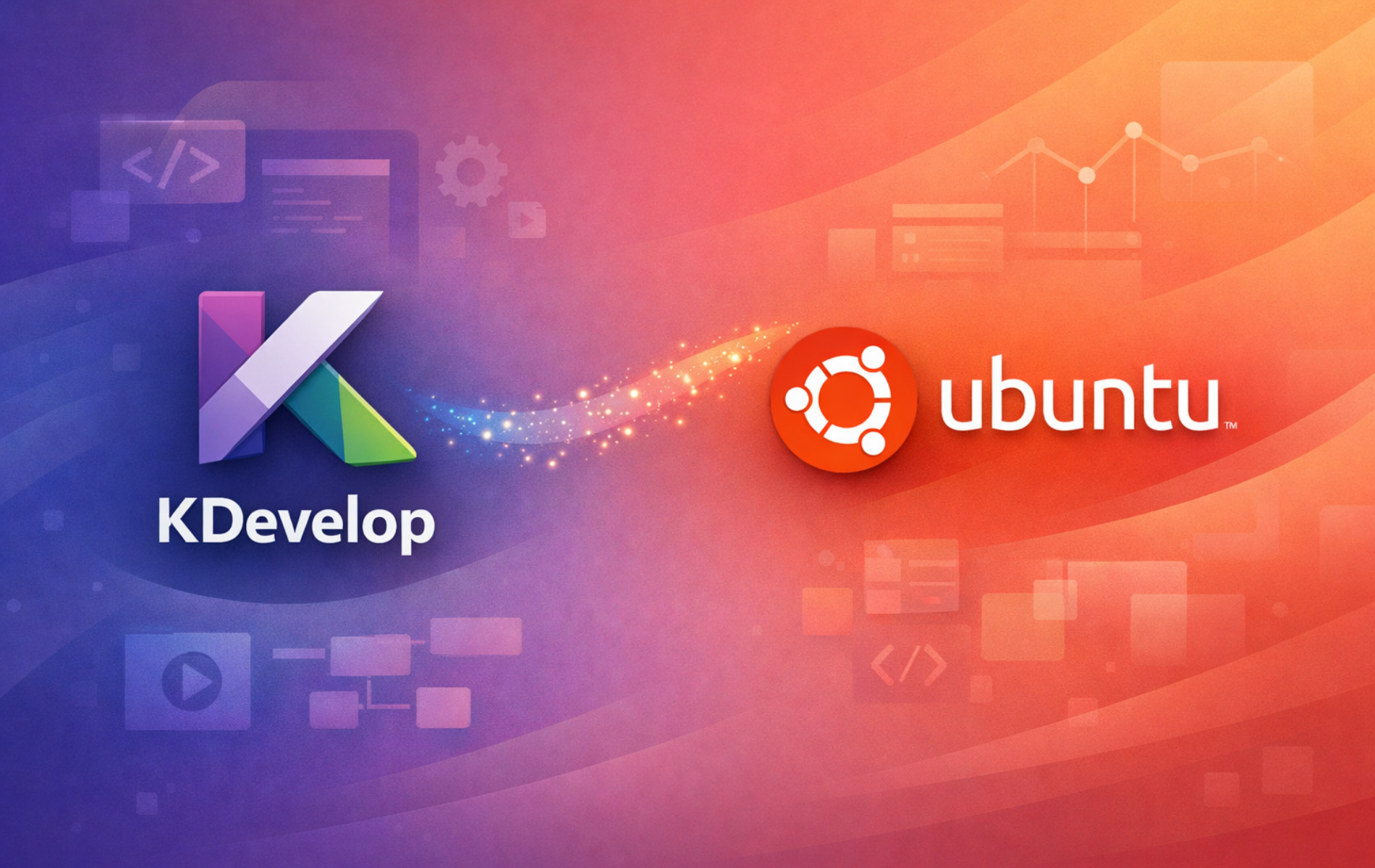KDevelop is a free, open-source integrated development environment (IDE) built by the KDE community for C, C++, Python, PHP, and other programming languages. It provides intelligent code completion powered by Clang, syntax highlighting, integrated debugging with GDB, and built-in version control integration through a plugin-based architecture. Whether you are building Qt applications, working on kernel modules, developing cross-platform software, or contributing to open-source projects, KDevelop offers a powerful and customizable workspace for your development needs.
This guide walks through installing KDevelop on Ubuntu using APT, Snap, or Flatpak, with an additional section on compiling from source for developers who need the latest features. By the end, you will have a fully functional IDE ready for C++ and multi-language development, including verification steps to confirm your installation works correctly.
Choose Your KDevelop Installation Method
Ubuntu offers multiple ways to install KDevelop, each with different trade-offs between stability, version freshness, and integration with your system. The table below summarizes the options covered in this guide:
| Method | Channel | Version | Updates | Best For |
|---|---|---|---|---|
| APT Package Manager | Ubuntu Repos | Distribution default | Automatic via apt upgrade | Most users who prefer stability and easy maintenance |
| Snap | Snapcraft | Latest stable | Automatic background updates | Users wanting newer releases with minimal setup |
| Flatpak | Flathub | Latest stable | Manual via flatpak update | Users preferring sandboxed applications |
| Source Compilation | KDE Developer Docs | Development/latest | Manual recompilation | Developers needing bleeding-edge features or patches |
For most users, the APT method is recommended because it integrates with Ubuntu’s package management, receives security updates automatically, and requires the least maintenance. Choose Snap or Flatpak if you need a newer version than your distribution provides, or compile from source if you are contributing to KDevelop development or need unreleased features.
This guide covers Ubuntu 22.04 LTS, 24.04 LTS, and 26.04 LTS installations. The APT package versions differ between releases (21.12 on 22.04, 23.08 on 24.04, 25.12 on 26.04), while Snap and Flatpak provide the same latest version regardless of your Ubuntu release. Commands shown work identically across all supported LTS versions.
Method 1: Install KDevelop via APT
The APT package manager provides the most straightforward installation path for KDevelop. This method installs a version tested and maintained by Ubuntu’s package maintainers, ensuring compatibility with your system libraries and receiving security updates through the standard apt upgrade process.
Update Ubuntu Package Index
Before installing new software, refresh your package index to ensure you receive the latest available version and avoid dependency conflicts:
sudo apt update && sudo apt upgradeInstall KDevelop via APT Command
Once your package index is current, install KDevelop along with its recommended dependencies. The package manager automatically pulls in the KDE libraries and development tools that KDevelop requires:
sudo apt install kdevelopThis command installs KDevelop and its core dependencies, including the KDE Frameworks libraries, Clang integration for C/C++ parsing, and the Kate text editor component. Additionally, the installation recommends development tools like GCC, GDB debugger, Make, and Git, which you should install if you plan to compile and version-control your projects.
Verify APT Installation
Once the installation completes, confirm that KDevelop is properly installed by checking the package status:
dpkg -s kdevelop | grep -E 'Package:|Version:|Status:'You should see output similar to the following, which confirms successful installation:
Package: kdevelop Status: install ok installed Version: 4:23.08.5-0ubuntu3
The version number varies by Ubuntu release. Specifically, Ubuntu 22.04 provides KDevelop 21.12, Ubuntu 24.04 provides 23.08, and Ubuntu 26.04 provides 25.12. However, all versions offer the core IDE functionality with Clang-based code intelligence, integrated debugging, and version control support.
Method 2: Install KDevelop via Snap
Snap packages provide a newer version of KDevelop than the default Ubuntu repositories, with automatic background updates. The KDE community maintains the Snap version, which typically tracks the latest stable release within days of upstream announcements.
Verify Snap Availability
Ubuntu includes Snap by default on standard desktop and server installations. To confirm snapd is available, check its status:
snap versionIf the command returns version information, then Snap is ready. However, if snapd is missing (common on minimal or container installations), install it with sudo apt install snapd and restart your session before continuing.
Install KDevelop via Snap Command
Next, install KDevelop from the Snap Store using the following command. The --classic flag is required because KDevelop needs access to your file system, compilers, and build tools outside the Snap sandbox to function as a full-featured IDE:
sudo snap install kdevelop --classicThe download and installation typically complete within a minute, depending on your connection speed. Because Snap handles all dependencies internally, you do not need to install any additional packages.
Verify Snap Installation
Once installation completes, verify that KDevelop is correctly installed and accessible:
snap list kdevelopYou should see output similar to the following, confirming the installed Snap package:
Name Version Rev Tracking Publisher Notes kdevelop 24.08.3 423 latest/stable kde✓ classic
The checkmark next to “kde” confirms this is an officially published package from the KDE community. The classic note indicates the package has full system access as expected for an IDE that needs to invoke compilers and debuggers.
Method 3: Install KDevelop via Flatpak with Flathub
Flatpak provides another route to the latest KDevelop version, with the added benefit of application sandboxing. The KDE community maintains the Flathub version, which receives updates independently of your Ubuntu release cycle.
Flatpak is not pre-installed on Ubuntu. If you have not set it up yet, install it with
sudo apt install flatpakand restart your session before continuing. For detailed setup including the Flathub repository, follow our Flatpak installation guide for Ubuntu.
Add Flathub Repository
First, ensure the Flathub repository is configured as a Flatpak remote. This command adds Flathub if it is not already present, or does nothing if it is already configured:
sudo flatpak remote-add --system --if-not-exists flathub https://flathub.org/repo/flathub.flatpakrepoInstall KDevelop via Flatpak Command
Next, install KDevelop from Flathub. The -y flag automatically confirms the installation prompt:
sudo flatpak install --system flathub org.kde.kdevelop -yFlatpak downloads the application along with any required KDE runtimes. The initial download may be larger than the Snap or APT versions because Flatpak bundles its own runtime libraries, but subsequent updates are typically smaller delta downloads.
Verify Flatpak Installation
Once the installation finishes, confirm that KDevelop appears in your Flatpak application list:
flatpak list --system --app | grep -i kdevelopYou should see output similar to the following, which confirms the installation:
KDevelop org.kde.kdevelop 6.4.251200 system
The “system” designation indicates that you installed the application system-wide, making it available to all users on the machine.
Method 4: Compile KDevelop from Source
Building KDevelop from source is appropriate if you need the absolute latest development version, want to contribute patches, or require custom compilation flags. This method involves significantly more setup than the package-based options and requires maintaining your build manually.
Source compilation targets experienced developers. For day-to-day use, the APT, Snap, or Flatpak methods provide a much simpler experience with automatic updates. Therefore, only pursue this method if you have a specific reason to build from source.
The KDE community maintains comprehensive build instructions using kde-builder, the official KDE meta-build tool that handles fetching source code, managing dependencies, and building KDE projects. This tool replaced the older kdesrc-build and is now the recommended approach. For detailed, up-to-date compilation steps, refer to the official KDE development environment setup guide.
Install Build Dependencies
Before compiling, install the essential build dependencies. This list has been tested on Ubuntu 22.04, 24.04, and 26.04:
sudo apt install build-essential cmake git extra-cmake-modules libkf5archive-dev libkf5config-dev libkf5coreaddons-dev libkf5guiaddons-dev libkf5i18n-dev libkf5iconthemes-dev libkf5itemmodels-dev libkf5itemviews-dev libkf5jobwidgets-dev libkf5kio-dev libkf5newstuff-dev libkf5parts-dev libkf5service-dev libkf5texteditor-dev libkf5threadweaver-dev libkf5xmlgui-dev libkomparediff2-dev llvm libclang-dev qtbase5-devThis command provides the KDE Frameworks libraries, CMake build system, LLVM/Clang for C++ parsing, and Qt5 development files that KDevelop requires. Because these package names remain identical across all supported Ubuntu LTS releases, you can use this same command on any version.
Set Up kde-builder
The recommended approach uses kde-builder, which automates the entire KDE build process. First, run the initial setup script to install the tool and configure your environment:
cd ~
curl 'https://invent.kde.org/sdk/kde-builder/-/raw/master/scripts/initial_setup.sh' > initial_setup.sh
bash initial_setup.shThis script installs git and other required packages, then places the kde-builder executable in ~/.local/bin. After the script completes, generate a configuration file:
kde-builder --generate-configEnable Source Repositories
Building KDE software requires source repositories enabled so you can install build dependencies. On Ubuntu 24.04 and newer, edit /etc/apt/sources.list.d/ubuntu.sources and change Types: deb to Types: deb deb-src. On Ubuntu 22.04, edit /etc/apt/sources.list and uncomment lines starting with deb-src. After editing, run:
sudo apt updateBuild KDevelop
Once kde-builder is configured, build KDevelop and its parser generator:
kde-builder kdevelop-pg-qt kdevelopThis command fetches the KDevelop source code and its parser generator (kdevelop-pg-qt), resolves KDE-specific dependencies, compiles the project, and installs it to your local KDE prefix (typically ~/kde/usr). The initial build takes considerable time and disk space (allocate at least 15GB).
Optional Plugin Dependencies
KDevelop uses a plugin architecture, and some features require optional dependencies. You can skip specific plugins during the CMake configuration step if their dependencies are unavailable. For example, to build without Subversion integration:
cmake -DCMAKE_DISABLE_FIND_PACKAGE_SubversionLibrary=ON ..Replace SubversionLibrary with the name of any optional dependency you wish to exclude. Consult the CMake output during configuration to see which optional features are detected.
Launch KDevelop
With KDevelop installed, you can launch it from either the command line or your desktop environment’s application menu.
Launch KDevelop from Terminal
Use the appropriate command based on your installation method:
APT installation:
kdevelopSnap installation:
snap run kdevelopFlatpak installation:
flatpak run org.kde.kdevelopSource compilation: If you built with kde-builder, source the environment script first:
source ~/kde/build/kdevelop/prefix.sh
kdevelopLaunch KDevelop from Applications Menu
For desktop users, the most convenient way to launch KDevelop is through the graphical application menu. Navigate to:
Activities > Show Applications > KDevelop
Alternatively, search for “KDevelop” in the Activities overview or application launcher. The first launch may take a few seconds while KDevelop initializes its plugin system and indexes any previously opened projects.


Manage KDevelop
Update KDevelop
Regular updates ensure you have the latest bug fixes, security patches, and feature improvements. The update process differs based on your installation method.
APT installation: Updates arrive through the standard system upgrade process. Run the following command periodically to check for and install updates:
sudo apt update && sudo apt upgradeSnap installation: Snap packages update automatically in the background. To force an immediate check for updates, run:
sudo snap refresh kdevelopFlatpak installation: Update all Flatpak applications, including KDevelop, with:
sudo flatpak update --systemSource compilation: Re-run the kde-builder command to fetch the latest source code and rebuild:
kde-builder kdevelop-pg-qt kdevelopRemove KDevelop
If you no longer need KDevelop, use the appropriate removal command for your installation method. Each command removes KDevelop and cleans up associated files.
APT installation: Remove the package and automatically clean up orphaned dependencies:
sudo apt remove kdevelop && sudo apt autoremoveThe autoremove command removes KDE libraries and other packages that APT installed as dependencies but that no other software currently requires. As a result, this typically frees several hundred megabytes of disk space.
Snap installation:
sudo snap remove kdevelopFlatpak installation: The --delete-data flag removes application data stored in ~/.var/app/org.kde.kdevelop/, including cached files and local configuration:
sudo flatpak uninstall --system --delete-data org.kde.kdevelop -yAdditionally, after removing a Flatpak application, you can also remove unused runtimes to reclaim additional disk space:
sudo flatpak uninstall --system --unusedSource compilation: Remove the build and source directories manually. Verify the paths match your kde-builder configuration before running this command:
rm -rf ~/kde/build/kdevelop ~/kde/build/kdevelop-pg-qt ~/kde/src/kdevelop ~/kde/src/kdevelop-pg-qtKDevelop stores user configuration and project data in
~/.config/kdeveloprcand~/.local/share/kdevelop/. The package uninstallation commands do not remove these directories. Therefore, if you want a complete cleanup, back up or delete these directories manually after uninstalling.
Troubleshooting
KDevelop Fails to Start with Qt Platform Errors
If you see errors like “could not connect to display” or “Qt platform plugin could not be initialized,” then the issue typically involves a missing display server connection or X11/Wayland configuration. This problem commonly occurs when you run KDevelop from SSH sessions or containers without display forwarding.
Solution: Ensure you are running KDevelop from a graphical session. For SSH connections, enable X11 forwarding with ssh -X user@host, or use a remote desktop solution. If you need to run KDevelop headlessly for testing, set the platform to offscreen:
QT_QPA_PLATFORM=offscreen kdevelop --helpMissing Compiler or Debugger Integration
KDevelop provides IDE features but does not bundle compilers or debuggers. Therefore, if your projects fail to build or debugging remains unavailable, you need to install the recommended development tools:
sudo apt install build-essential gdb clangThis command installs the GCC compiler, the GDB debugger, and Clang for enhanced code analysis. Once the installation completes, restart KDevelop so it can detect the new tools automatically.
Slow Code Completion or Indexing
KDevelop uses Clang to parse C++ code, which can become resource-intensive for large projects. If code completion runs slowly or the IDE feels unresponsive, then consider these optimizations:
- Increase the number of background parser threads in Settings → Configure KDevelop → Language Support → Background Parser
- Exclude large generated directories (like build folders) from parsing via the project configuration
- Ensure your system has sufficient RAM; C++ parsing benefits from 8GB or more for large codebases
- Close unused projects to reduce the parsing workload
Flatpak Version Cannot Access System Compilers
Flatpak applications run in a sandbox with limited access to system tools. As a result, if the Flatpak version of KDevelop cannot locate your system compilers, you have two options:
- Install the Flatpak SDK extensions that include development tools:
sudo flatpak install --system flathub org.kde.Sdk - Switch to the APT or Snap installation, which have full system access
For serious C++ development work, the APT or Snap installations typically provide better integration with system-installed toolchains.
Conclusion
You now have KDevelop installed and configured on Ubuntu, which provides a full-featured IDE for C++, Python, and other languages. The APT installation offers the simplest maintenance path with automatic security updates, whereas Snap and Flatpak provide access to newer releases. For developers working on KDevelop itself or needing unreleased features, source compilation via kde-builder remains an option; however, this approach requires more disk space and ongoing maintenance. With integrated debugging, intelligent Clang-powered code completion, and version control support, KDevelop provides a capable environment for projects ranging from small utilities to large-scale software development.



Formatting tips for your comment
You can use basic HTML to format your comment. Useful tags currently allowed:
<code>command</code>command<strong>bold</strong><em>italic</em><a href="URL">link</a><blockquote>quote</blockquote>